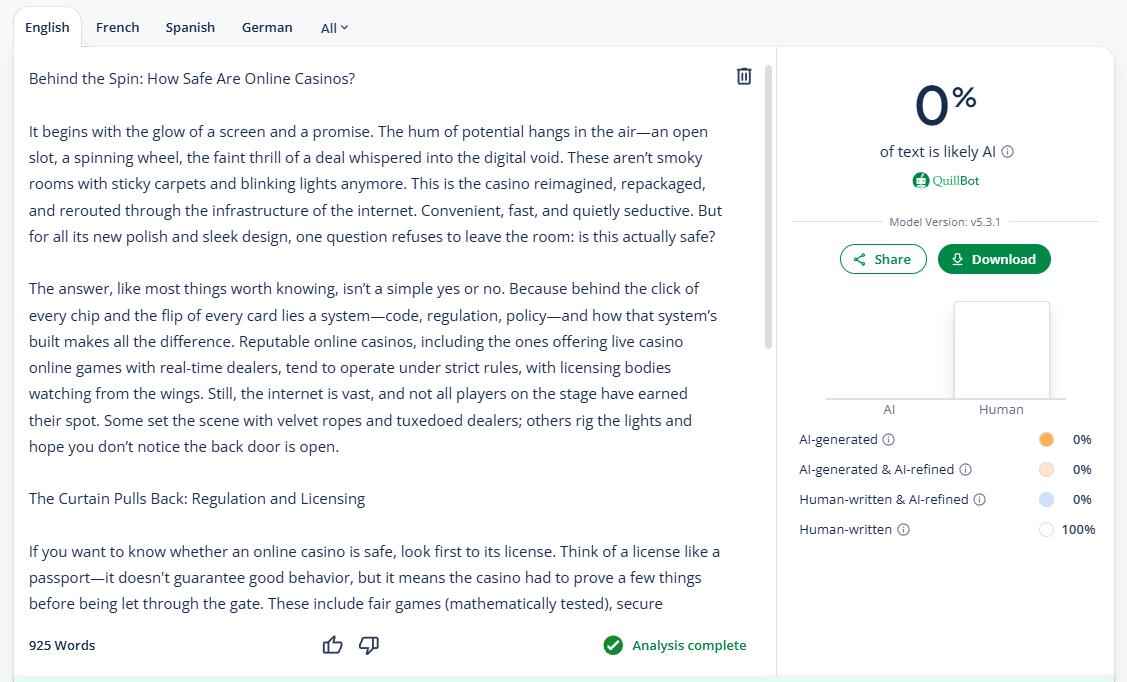Behind the Spin: How Safe Are Online Casinos?

Behind the Spin: How Safe Are Online Casinos?
t begins with the glow of a screen and a promise. The hum of potential hangs in the air—an open slot, a spinning wheel, the faint thrill of a deal whispered into the digital void. These aren’t smoky rooms with sticky carpets and blinking lights anymore. This is the casino reimagined, repackaged, and rerouted through the infrastructure of the internet. Convenient, fast, and quietly seductive. But for all its new polish and sleek design, one question refuses to leave the room: is this actually safe?
The answer, like most things worth knowing, isn’t a simple yes or no. Because behind the click of every chip and the flip of every card lies a system—code, regulation, policy—and how that system’s built makes all the difference. Reputable online casinos, including the ones offering live casino online games with real-time dealers, tend to operate under strict rules, with licensing bodies watching from the wings. Still, the internet is vast, and not all players on the stage have earned their spot. Some set the scene with velvet ropes and tuxedoed dealers; others rig the lights and hope you don’t notice the back door is open.
The Curtain Pulls Back: Regulation and Licensing
If you want to know whether an online casino is safe, look first to its license. Think of a license like a passport—it doesn't guarantee good behavior, but it means the casino had to prove a few things before being let through the gate. These include fair games (mathematically tested), secure payment systems, identity verification tools, and protections against fraud. Most trustworthy sites display this information publicly, often in the page footer, but not all that glitters is gold.
The trouble, of course, is that digital space is full of mirrors. A casino might look legitimate—clean design, slick menus, even a live casino online feature streamed in high definition—but beneath that polish, it might be operating under questionable oversight or none at all. It's a bit like that moment in The Truman Show when Truman discovers the world around him is fake. It looked real. It felt real. But someone was controlling every move behind the scenes. That illusion is precisely what you want to avoid when gambling online.
Understanding Randomness and Fair Play
Let’s strip it back to the bone: when you place a bet online, you’re handing over money based on trust. Trust that the game is fair. Trust that the odds haven’t been quietly nudged out of reach. In physical casinos, randomness is something you can see—the shuffle of a deck, the bounce of a ball. In digital casinos, that randomness comes from algorithms called random number generators, or RNGs. These are essentially computer programs designed to mimic unpredictability.
For reputable sites, RNGs are tested by third-party auditors, usually part of the licensing process. These tests verify that the results you see—wins and losses—are as fair as they would be in a brick-and-mortar setting. But for sites operating in murky waters, that same RNG might be nothing more than a cleverly disguised script favoring the house every time. It's not cheating in the flashy, Ocean’s Eleven sense. It’s quieter. Invisible. A few lines of code rerouted. And unless you know where to look, you'd never spot it.
Money, Movement, and Red Flags
Transactions—both in and out—should be smooth. A safe online casino will have clear information about withdrawal times, identity checks, and deposit limits. They’ll offer customer support that actually responds. Delays and excuses when you try to collect winnings? That’s a warning sign. So are casinos that push aggressive bonuses with impossible terms. If a deal sounds too good to be true—like doubling your deposit with zero strings attached—it probably is.
In many ways, this is where politics quietly bleeds into the conversation. Regulations around online gambling vary wildly depending on where you live, and some governments are stricter than others. That patchwork of laws creates grey zones—digital alleyways where less-than-honest operations can thrive. A casino might be banned in one country and operate freely in another, depending on who’s watching and who isn’t. For players, that means one of the best tools at your disposal is simply research. A quick background check—what license, what reviews, what rules—can save a world of trouble.
Security in the Digital Age
A reputable casino doesn’t just care about fairness; it guards your data like Fort Knox. That means encrypted connections (look for HTTPS in the web address), secure logins, and privacy policies that don’t read like a trap. If you’ve ever noticed your email suddenly flooded with unrelated spam after signing up for something, you’ve experienced a site that doesn’t respect data. Safe online casinos treat your information like your money: not something to be thrown around.
And that security applies doubly to payment systems. Reputable casinos use established gateways—bank cards, e-wallets, sometimes even cryptocurrency—with clear documentation and fast turnaround. If you're being asked to wire money in strange ways or through unfamiliar apps, slam the brakes. That’s not just shady; it’s dangerous.
When the Lights Dim: Entertainment vs. Obsession
At its best, online gambling is a form of entertainment. A way to unwind. The same as binging your favorite show or watching a game on a lazy Sunday afternoon. It becomes a problem when it shifts from fun to fixation. Safe casinos know this, which is why they often include tools for self-exclusion, spending limits, and account monitoring. These aren’t just ethical practices—they’re required by most licensing bodies. If you’re not seeing those options? Another red flag.


{{comment.anon_name ?? comment.full_name}}
{{timeAgo(comment.date_added)}}
{{comment.body}}
{{subComment.anon_name ?? subComment.full_name}}
{{timeAgo(subComment.date_added)}}
{{subComment.body}}